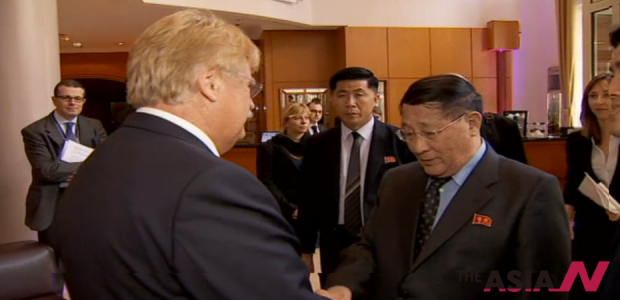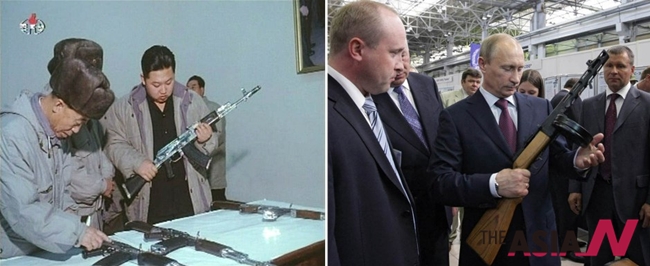
North Korea’s failing diplomacy in Europe, Russia and Japan
By Andrei Lankov
Kang Sok-ju, Korean Workers’ Party secretary for international issues, has departed for a trip to a number of European countries. He visits Italy, Switzerland, Belgium and Germany where he meets local politicians from assorted political parties. There is little doubt that the expected visit of a high level North Korean dignitary is meant to be an attempt to improve North Korean relations with Europe.
Such an attempt agrees very well with what we have heard about North Korean diplomacy throughout the last few months. Apart from Europe, North Korean diplomats have recently begun to pay much attention to Japan and Russia.
Last spring and early summer, there was a great deal of talk about the need of North Korea to improve relations with Russia and to dramatically increase bilateral trade – contrary to widespread misconceptions, trade between the two is basically non-existent present. The fallout over Ukraine and subsequent deterioration of Russia’s relations with the West has proved to be quite useful from the North Koreans point of view: in the new situation, Russia is more inclined to make deals with Pyongyang.
At the same time, North Korean diplomats have begun to consort with Japan. The North Korean side even made some concessions pertaining to the seemingly insolvable abductee issue – expecting, of course, some monetary rewards and economic assistance in exchange for the cooperation.
It remains to be seen to what extent such efforts will bear fruit. It is quite possible that West European diplomats will ignore North Korean advances. It remains to be seen whether Russia will be willing to subsidize trade with North Korea – and there are good reasons to suspect that without such subsidies will not grow fast enough. A number of problems prevent normalization of relations with Japan. So, a lot of uncertainties remain. It is nonetheless clear that current North Korean policy is aimed at moving beyond the China-US-South Korean triangle that has for the last two decades determined the direction of North Korean diplomatic activities.
This decision to turn away from the usual ‘diplomatic targets’ is largely driven by necessity. In the last two or three years, North Korean diplomacy has hit a wall in its interactions between Seoul, Washington and Beijing – or, at least, this is how North Korean diplomats are likely to see the situation.
Better relations with Washington has always been a major long-term goal in Pyongyang. Most North Korean top decision makers have seen Washington not only as a mortal threat, but also as a valuable source of aid and, potentially, trade. However, American officials have made it very clear over the last six years that concessions are not in the offing, until substantial progress is made in dealing with the nuclear issue. The latter option is not going seriously considered in Pyongyang because the North’s leaders see nuclear weapons as the only guarantee of their political and physical survival, and as a crucial source of diplomatic power. So, the result is a stalemate.
It is more difficult to ascertain who is responsible for the ongoing crisis in relations between North and South Korea. It seems that the South Korean government is not particularly flexible and is quite unwilling to provide North Koreans with the concessions that they wish to receive. However, it seems that the North Korean side is also very suspicious about the current centre-right government of Park Geun-hye. North Korea seems not to be eager to exploit opportunities to improve relations with Seoul. It appears that North Korean decision makers have decided that good relations with South Korea would be either impossible or undesirable so long as South Korean conservatives remain in control of the blue house.
At first glance, it seems that relations between Pyongyang and Beijing must be less problematic, but this is not actually the case. Compared to its predecessors, the new Beijing administration of Xi Jinping seems to be more critical of North Korea, but it still remains willing to provide it with a substantial amount of aid and preferential trade. China needs a stable North Korea. However, such feelings are not reciprocated by North Korea’s leadership, who increasingly worry about trade and the steadily growing economic dependency of North Korea on China. Currently, China controls some three-quarters of North Korea’s foreign trade, and it appears that North Korea’s decision makers are afraid that one day China will try to transform their economic influence into political leverage – something that the deeply nationalistic North Korean leadership is deeply afraid of.
Perhaps, initially the Kim Jong Un government hoped that the old tactics of manufacturing an artificial crisis would help make South Korea and the United States more willing to make concessions. This might be the reason behind the unusual display of the verbal bellicosity in the spring of 2013. However, these spectacular outbursts of bellicose chest-beating produced little if any results. Obviously, the North Korean leadership is now engaged in uneasy search of new partners in Europe, Russia and Japan.
It is not going to be easy: Kang Sok-ju’s mission now faces some significant problems in Europe. The European economy is not in good shape nowadays, so the Europeans are unlikely to be especially generous with aid, of when we consider North Korea’s notorious reputation as an aid recipient. Trade with Europe might be a good idea in theory, but in practice, great geographical distances and certain economic incompatibilities would probably prevent a boom in trade between North Korea and Europe from happening. Nonetheless, the North Korean government is doing what it can to find alternatives and to steer their foreign policy away from the roots that they have been stuck to for many years.




